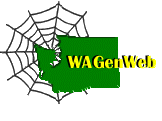Pioneer life in the Benton Co. WA area
Saloon Keepers Friendly Lot/ Liquor Dealers Muscled in
By BURTON 0. LUM
Tri-City Pioneer
Sunday, 9 July 1961, page 5
The first saloon keepers in the Tri-City area owned their buildings and their merchandise. They were financially well fixed and few of them drank intoxicating liquors. These saloon keepers were among the leading citizens of the communities.
The buildings erected for saloon purposes were two stories high. The first floor contained the bar, a pool table, a billiard table, several round card tables where cards could be played and drinks served. Many large strong chairs were arranged around the tables and grouped about the big bellied heating stove. Small boxes filled with ashes were scattered handily around on the floor for the tobacco chewers. The window glass was protected with several horizontal metal bars. Reflector oil lamps hung on wall brackets were used for light. Two double action swinging doors were hung inside the front door. The front door stood ajar except when the saloon was swamped out.
There was no inside stairway from the first floor to the second story. The only entrance to the second floor was by means of an outside rear stairs. The proprietor and family lived in these quarters.
In these early days all liquor was sold by the bottle, the proprietor furnishing only the glass from which it was drunk and ice if the purchaser requested it. The bar itself was then used mostly for storage purposes.
The laws of the Washington Territory forbade women to enter places where intoxicating liquors were sold. The proprietor being the owner, bought his merchandising wherever he pleased and ran his business to suit himself and his trade. These conditions were not to last long. The early day manufacturers and suppliers of intoxicants were not satisfied with their wholesale profit, they wished to muscle in on the retail profit also. They organized themselves into liquor supply companies and refused to sell supplies to the saloon owners, unless the owners would agree to their terms. The terms soon broke the owners. The organized liquor supple companies took over. They placed salaried managers in charge of the saloons requiring them to make certain profits. If the managers could not make these profits legitimately, they made them illegitimately. Patrons were gotten drunk, decoyed into crooked card games and fleeced of their funds, and then kicked out on the street.
The self owned early saloon with its respectability was gone. In its place was a dive of iniquity which hastened the day of prohibition. The freedom loving Americans were not satisfied with prohibition and eventually passed laws repealing it. A contributing cause, perhaps, of the repealing of prohibition was the difficulty of its enforcement and the rise of bootlegging and illicit stills.
The old self-owned-and-operated saloon in Washington Territory was quite an institution in its day. The owner generally owned a livery stable also and between the saloon and livery stable he knew about everything that transpired. In the early days there were no local newspapers, so the saloon was the public information center for everyone. The saloon keeper was always a person easy to meet and friendly. He played an important part in development of the frontier. When this type of saloon passed, he developed his livery business and his livery stable became the most reliable source of news for the pioneers. People visited more in the early time because of the lack of other means to acquire information.
Return to Index of Burton Lum Articles
